
A new injectable option for HIV treatment/prevention could be on the horizon. That is… if the upcoming human trials go well.
According to the Deseret News, scientists from the University of Utah are developing an injectable drug for HIV prevention and treatment. The Utah researchers recently saw a successful set of tests using monkeys, and now they hope to repeat that success with human subjects.
The drug, called CPT31, blocks HIV from entering healthy cells and from spreading throughout a person’s body. This drug, which has been under development for five years, is based on a compound called a D-peptide. A D-peptide is similar to a natural-born peptide. The one big difference, however, is that D-peptides have a longer lifespan. This is important because peptides help with the fight against HIV within the human body.
“It’s exciting because it works differently than any of the other drugs that are commonly used to treat HIV, and so it would be helpful for patients who have drug-resistant HIV, which is a common problem with the existing drugs,” explained Dr. Michael Kay, a University of Utah Health professor of biochemistry who’s a senior author in the study.

“This is one of the very first of this type of drugs to make it this far, and is the only example we’re aware of that’s being used against HIV so far,” he added.
In the trials with primates, the monkeys were exposed to a form of HIV that can affect them called SHIV. None of the monkeys developed signs of infection, however, so it seems CPT31 protected them. As for monkeys that were already diagnosed with SHIV, 30 days of CPT31 treatment resulted in a significantly lower level of the virus.
Working alongside the National Institute of Allergy and Infectious Diseases, Beth Israel Deaconess Medical Center in Boston, and a pharmaceutical company called Navigen, the University of Utah researchers are hoping to turn CPT31 into an injectable drug that would target a part of HIV that barely changes as the virus mutates. This would make it successful in preventing and treating multiple strains.

“We’re envisioning that this might be a suitable component as an injectable cocktail that patients could get every month, maybe even every three months or even less frequent,” Dr. Kay said.
But that might not be the end of CPT31’s journey, as Kay and his associates are hopeful that they could apply the techniques developed in creating CPT31 to other viruses like SARS-CoV-2 (the virus that causes COVID-19).
“We’re really excited about applying those validated methods and technologies to a new virus-like for COVID-19. And what we think will be dramatically faster than the first time, with HIV,” Kay said.
We’ll keep our fingers crossed for the success of the upcoming human trials.
Source: Deseret News,
